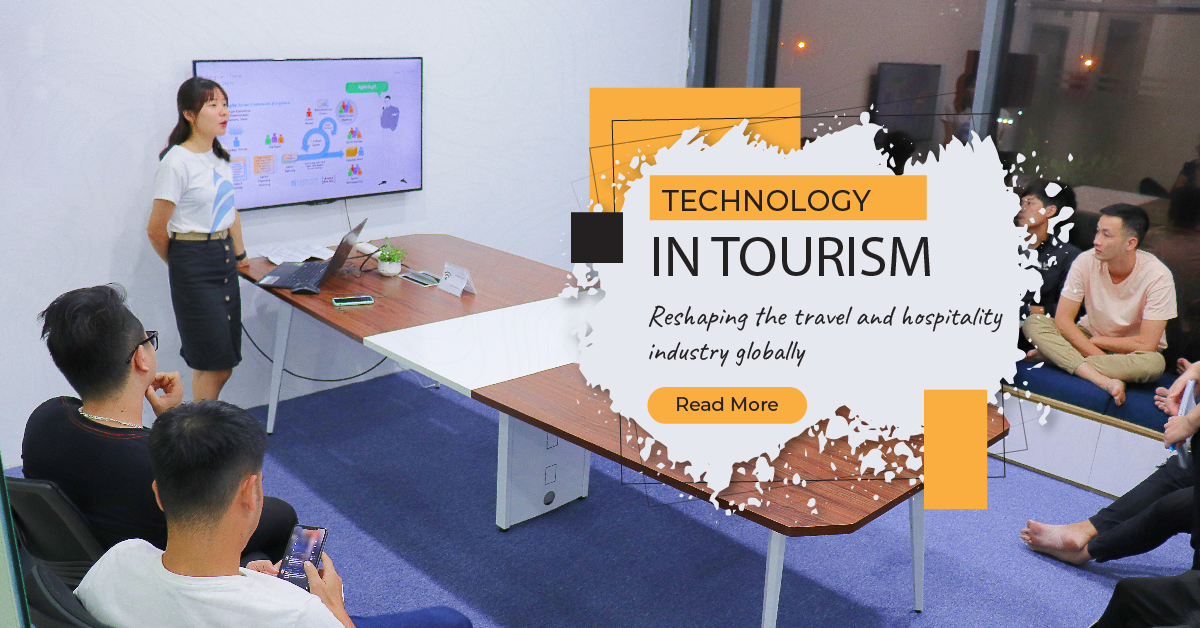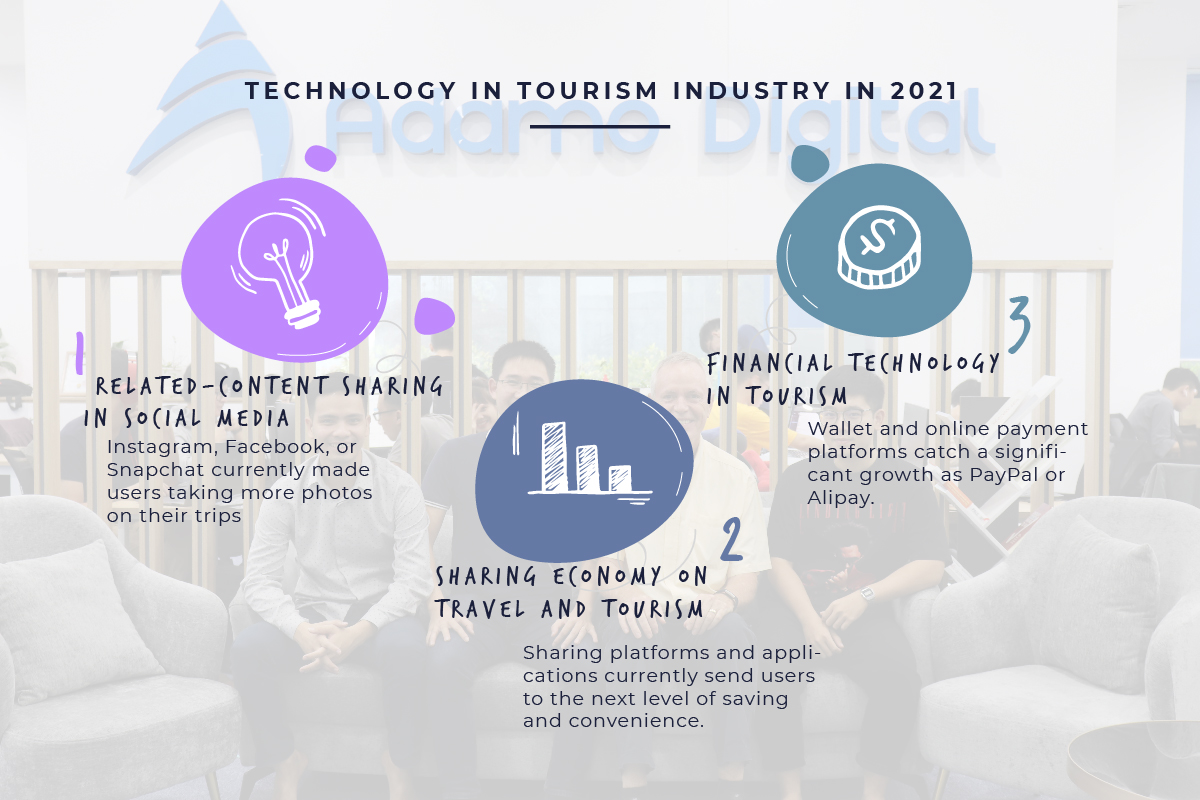Technology in tourism reshaping the travel and hospitality industry globally

Apparently, technology in tourism has a profound impact on the industry movement. It rapidly changes the behavior of both suppliers and customers in the market.
Indeed, Information Technology caused disruption in hospitality software development services. Technological development in tourism seemingly added more advancement in the value chain. Evidently, travel itinerary planning is currently involved with various technological innovations, including online booking engines, real-time transaction management, or an all-in-one travel marketplace platform.
Accordingly, innovative technology in tourism powers fair customer transactions by deterring possible asymmetric information. Users these days could handily browse trusted information on the internet with contributions from many sources. They would not be manipulated by one-sided information coming from media or suppliers.
Besides, the rapid innovation for tourism technology also changes the way companies and travel business target and make a relationship with customers. Whereby, hotel and flight reservations are seemingly influenced significantly by digital transformation in tourism.
Technology in tourism industry
Obviously, technology in tourism industry profoundly penetrates to adjust every activity in the market. In which, it consists of both opportunities and challenges to travel and hospitality business in reaching their customers.
Disruption of technology in tourism
Among several players, online travel agencies (OTA) have proved their significant role in shaping user experience on the internet. Google Travel reported that roundly 75% of travelers planned their travel itineraries on online platforms. Accordingly, the typical players as Agoda, Booking.com, or Airbnb have captured the vast benefit from the leisure travel industry.
In Asia, a significant representative of the successful player named Traveloka, which is the all-in-one travel booking platform for airfares, accommodations, hotels, and also vehicles. Currently, Traveloka estimate serves 40 million regular users with several payment options.
From the users’ perspective, technology in tourism has a profound impact heavily on the decision-making of millennials, who are tech-savvy and passionate ‘traveloholics’. Also, this generation has the financial capacity to pursue their interests. Hence, social media, mobile technology, and reviews became the norm for users in the travel and hospitality industry.
Impact of technology in tourism industry
When it comes to the impact of technology on the travel and tourism industry, it cannot ignore the digital transformation in post-pandemic, which form a new world order in several continents.
In Euro and Australia, when COVID19 shut down the majority of International flights, travel software development companies have to focus on local tourism. Evidently, many hotels and OTAs currently promote their sale package aiming at domestic travelers instead of luxury services for foreigners.
In this situation, the impact of technology in tourism is indicated by booking engines with real-time booking with series of options and promotions. AI and Machine Learning are leverage in price comparison attracted in several travel booking platforms to provide users the best suitable deals. Additionally, AI and chatbots also offer an incredible opportunity to enhance user experience with instant support without any delay. Despite some technological limitations, on-demand AI assistants would cause transformation in human resource operation for the travel industry.

Technology development in travel and tourism
According to studies done regarding technology in tourism, the advancement would make significant short-term adjustments in recognition technology and mobile application in tourism.
Recognition technology in tourism industry
Travel identification with non-document is believed to benefit travelers. Hence, it changes the way people prepare for their trip. Instead of providing several documents as hotel confirmation, user ID, passport, and more, travelers currently have more option to provide their identity.
Accordingly, recognition technology in tourism industry consists of outstanding benefits to the user, including enhance more security, service non-transferability, and embrace a high level of efficiency.
| Recognition technology | Application |
| Face recognition technology | Automated hotel check-in, flight check-in Speed up orders process in food services Raise security and responsibility to vehicle sharing |
| Voice-Recognition Applications | Remote control smart rooms with hotel speakers Voice search in travel information searching Real-Time Translation |
| Fingerprint recognition | Access security or hotel room smart key technology |
| Eye scanning | Applying in touch fee post in airports Save time on airport security lines Eyes become passenger’s passport |
Mobile technology in tourism
With the rapid increase in smartphone owners, users currently could use their phones as erudite tour guides. In leveraging built-in software development, smartphones could provide users advance assistant to overcome challenges in their trips, including ride direction, destination suggestion, payment, and even breaking the language gap.
Expressly, we gathered here with popular mobile technology in tourism currently:
| Mobile technology in tourism | Application |
| On-demand connection | Connect users and providers before, during, and after their trips |
| On-demand conversations | AI, chatbot, instant messaging, virtual assistant |
| progressive web apps | API collections transfer web app to native mobile app |
| Personalized offers | AI and big data create custom packages for each account |
| Instant mobile payments | NFC, e-wallet, and one-click booking |
| Last-minute bookings | Explore inventory with more affordable price |
Technology in tourism industry in 2023
2023 deserves to be a milestone in the history of innovative technology in tourism that it pointed the beginning to the current decade

Future of travel related-content sharing in social media
Apparently, travel activities have changed due to the influence of social media platforms, in which Instagram, Facebook, or Snapchat currently made users taking more photos on their trips. Accordingly, the need for sharing travel experiences is seemingly a fundamental willingness among travelers. Here are some statistics will warn you how much social media influence users in during or post-trip:
_ Over 70% of social media accounts share their photos during their travel.
_ Roundly 35% of traveler decisions had been affected by information is available on social media regarding destination and accommodation
_ Interestingly, people would seemingly raise the time spending on social media during their trip.
In Australia, market experts propose that visualize content (using AR and VR technology) would expectedly dominate social sharing. Additionally, mobile-enabled technology would reshape the way companies approached travelers on the internet. Unfortunately, the concept of sharing steadily eliminates the horizon of privacy and personal identity since private data could be leverage for shameful behavior.
From social media attributes, users could create fake news, fake reviews, or fake experiences, without a doubt, to harm competitors as a dirty trick of PR activities. Hence, the technology in tourism industry application would be driven by social media development and the trend of an online presence. Also, companies would need to get ready with communication crises online.
The impact of sharing economy on the travel and tourism industry
The domination of sharing economy is undeniable that it captures the majority of global transactions. As significant innovation, sharing platforms and applications currently send users to the next level of saving and convenience.
In terms of money-saving, sharing economy platforms provide users comprehensive details about providers, while estimating the cost properly. Additionally, by sharing services or products for user groups, customers could cut off their payment, while suppliers optimize their resources.
In terms of convenience, technological development in tourism streamlines several merchants in one platform as all-in-one travel packages. Accordingly, Travel portal and travel booking engines gather several services in offering users all the components for their journey. Additionally, users can also leverage on-demand food delivery or food ordering system instead of coming to a restaurant. Besides, it offers extra experience on traveling.
Reports showed that roundly 60% of tourists used at least one sharing economy service during their trips. In which, they book shareable accommodations or hotels that Airbnb could be the most favorable platform. Besides, the ride-sharing business also indicates its benefit for both users and providers. In these cases, the technological platform development is seemingly the infrastructure to connect parties.
The domination of sharing economy expectedly continues in this decade, which drives the way business doing their marketing and advertising campaigns. By contrast, users currently express their concern regarding personal safety in using sharing economy services. Evidently, platform owners have less responsible for the incidents that occurred when vendors providing their services.
At this point, new technology in tourism industry would expectedly have more extensive control over user itineraries. In which, it would adjust the moderate acts from both users and providers. Hence, visitor tracking technology as real-time location, movement tracking, and personal digital maps, should be taken into account.
Financial technology in tourism
As tons of travel and hospitality transactions going online, the payment issues are raising social concern these days. Evidently, wallet and online payment platforms catch a significant growth as PayPal or Alipay. Accordingly, from 2021, there would be three key components of payment technology in tourism industry that should be taking into consideration:
_ Digital wallet: in fact, roundly 90% of European citizens using e-wallet for daily transactions in 2020. Whereby, they paid for restaurant meals, supper market, transformation, food ordering, travel accommodation, and more. Meanwhile, in America, the country indicates a more rapid adoption of e-payment than any other area globally. The new technology of digital wallets has been steadily developed and applied widely, such as a contactless card with NFC technology.
_ Mobile-based Point of Sale system: acting similar to digital wallets, mobile POS transforms the user’s smartphone into a mobility payment card. Users can pay by tapping their phone rather than bringing their card. This technology attached with authentication methodology seemingly protects users from being stolen money. In which biometric authentication, signature authentication, and face recognition are keys to development.
_ Near Field Communication (NFC) for phone connection with near devices. Without the requirement of internet connection, NFC allows smartphone owners done several tasks over the domination of internet providers.
Final thought: Technology in tourism have series of application, influencing customers and provider behaviors. As the top travel software development companies in Vietnam, Adamo Software provides firms lucrative travel development solutions for more benefit-generating outcomes.





